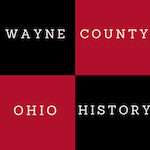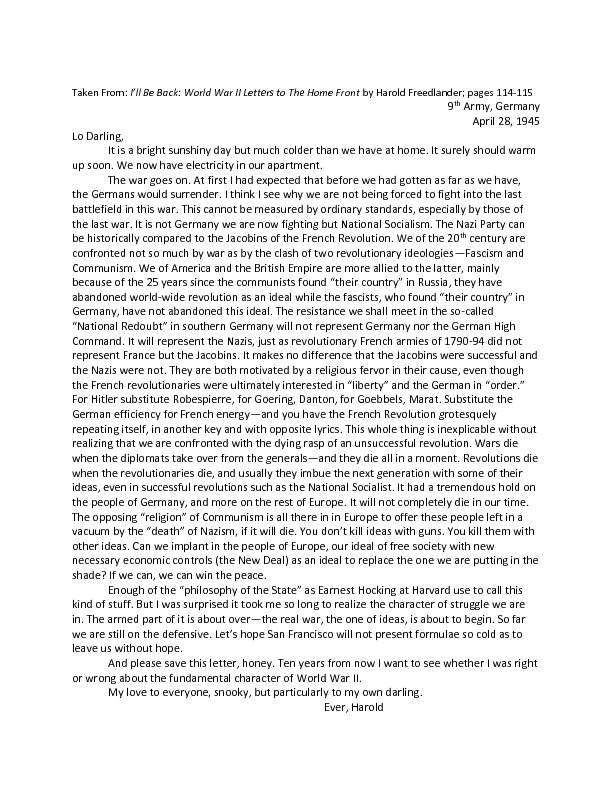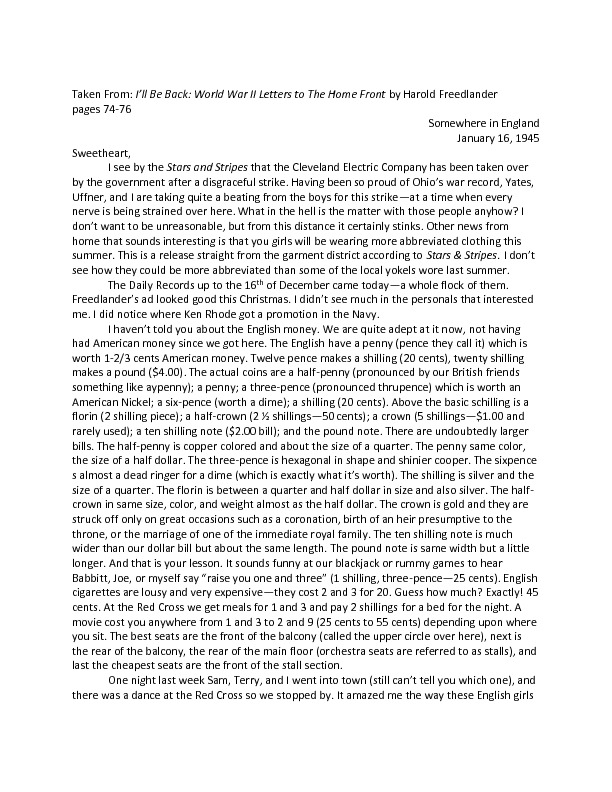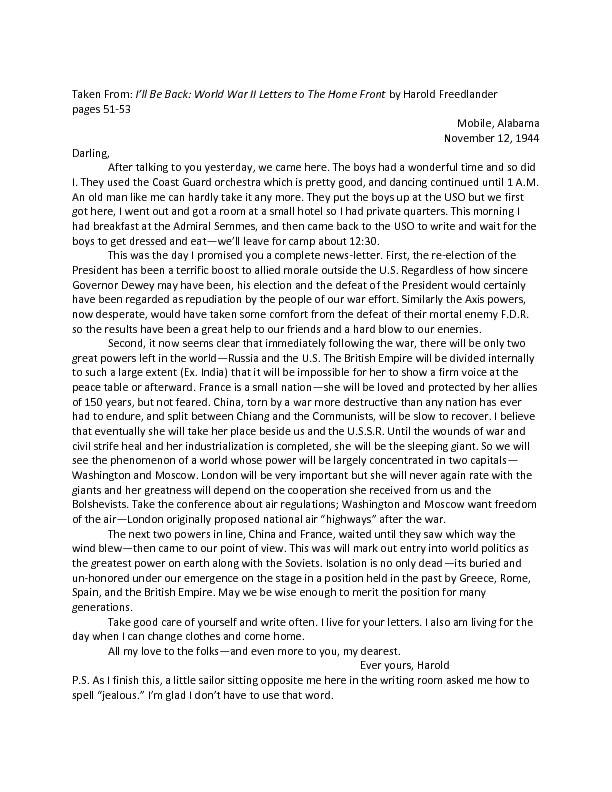Harold Freedlander
This letter, written by Harold Freedlander of Wooster, Ohio during the four years in which he was enlisted in the Army during World War II, looks at why the Germans are still fighting, even when he (and he presumes the Nazis as well) know that there is no way that the Germans could win. He says that they are no longer fighting Germany but National Socialism. Freedlander then goes on the relate this back to the Jacobins during the French Revolution. At such a late time in the war (less than a month away from official victory in Europe), the fight was about National Socialism, the principles it stood for, the way that it conducted government, and the possibility of a continuation of it. Similarly, the Jacobins in the French Revolution held control often by much political violence and radical legislation. This comparison made by Freedlander might be attributed to his degree in European History from Harvard College prior to his enrollment in the Army.
Use Ohio Social Studies Standards for American History 22 (The United States mobilization of its economic and military resources during World War II brought significant changes to American society) for integration into the classroom.
Use Ohio Social Studies Standards for Modern World History 8 (Enlightenment ideas on the relationship of the individual and the government influenced the American Revolution, French Revolution and Latin American wars for independence) and 15 (The consequences of World War I and the worldwide depression set the stage for the Russian Revolution, the rise of totalitarianism, aggressive Axis expansion and the policy of appeasement, which in turn led to World War II) for integration in the classroom.
This letter, written by Harold Freedlander of Wooster, Ohio during the four years in which he was enlisted in the Army during World War II, discusses his knowledge of what is happening back in home. Freedlander discussing the takeover of the Cleveland Electric Company by the federal government because of a strike by its workers. Freedlander goes onto discuss how he took quite a bit of heat about it, being from Ohio, from his friends that were with him. The federal government took over many business and factories during this time to divert their resources to the war effort, both abroad and at home. This allowed for the production of goods not only for the United States, but also its allies of France and Great Britain, both of which were lacking in goods as well.
Freedlander goes on to discuss and describe in great detail the money that he uses in Great Britain. While there was some provided to soldiers through the United States government and the Army, much of what a soldier may want or need has to be bought with the pay he receives for his service. A solider may buy anything from gifts for his loved ones at home to cigarettes to eating at a restaurant or going to a movie, some of which was more expensive overseas than it might be at home because of the low quantity of goods that was available. Freedlander found the money that Great Britain used to be fascinating and the price of his movie theatre ticket as well.
Use Ohio Social Studies Standards for American History 22 (The United States mobilization of its economic and military resources during World War II brought significant changes to American society) for integration into the classroom.
This letter, written by Harold Freedlander of Wooster, Ohio during the four years in which he was enlisted in the Army during World War II, discusses the outcome of the 1944 election, with Franklin D. Roosevelt elected to his fourth term as president. Freedlander discusses the boost in morale of the soldiers after his reelection, stating that if Governor Dewey would have won, it “would have certainly been regarded as repudiation by the people of our [soldier’s] war efforts.”[1] The soldiers that were across the ocean, or even just those that were assigned at camps in the United States as Freedlander was at this time, were aware of what was happening back in the United States and it effected their morale. They wanted to know that what they were fighting for was also something that the United States citizens were supporting.
Freedlander also depicts how he saw how the world would turn out following the War. Freedlander was not too much off, with the United States and the U.S.S.R. becoming the two major powers in the world following the end of World War II. The one thing that Freedlander was unable to foresee was the different ways that the United States and U.S.S.R. would establish their dominance. The U.S.S.R. would attempt to gain control of all of Eastern Europe in hopes to stomp any further attacks from the west. The United States, with just as much (if not more) political and military power than the U.S.S.R., would attempt to establish a policy of containment of the communist rule that the U.S.S.R. was trying to spread. In the end, Harold Freedlander had predicted the Cold War almost a year before the War would officially end in Europe.
Use Ohio Social Studies Standards for American History 22 (The United States mobilization of its economic and military resources during World War II brought significant changes to American society) and 24 (The United States followed a policy of containment during the Cold War in response to the spread of communism) for integration into the classroom.
[1] Freedlander, Harold, Lois Freedlander, Ann Freedlander Hunt, and Mimi Freedlander McCain. I’ll Be Back: Harold Freedlander’s World War II Letters to the Home Front. Wooster, Ohio: Wooster Book Co, 2002. 52.



